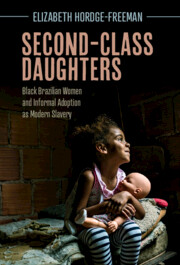Book contents
- Second-Class Daughters
- Afro-Latin America
- Second-Class Daughters
- Copyright page
- Dedication
- Contents
- Figure
- Acknowledgments
- Introduction
- 1 Adopting Modern Slavery
- 2 “Quase da Família” (Almost Family)
- 3 Prisoners of Love
- 4 Depths and Debts of Gratitude
- 5 Family Bonds and Bondage
- 6 Home Sick
- 7 Freedom to “Live Her Own Liberty”
- Conclusion
- Book part
- Works Cited
- Index
6 - Home Sick
Health, Disability, and Exploitation of Adult Filhas de Criação
Published online by Cambridge University Press: 10 March 2022
- Second-Class Daughters
- Afro-Latin America
- Second-Class Daughters
- Copyright page
- Dedication
- Contents
- Figure
- Acknowledgments
- Introduction
- 1 Adopting Modern Slavery
- 2 “Quase da Família” (Almost Family)
- 3 Prisoners of Love
- 4 Depths and Debts of Gratitude
- 5 Family Bonds and Bondage
- 6 Home Sick
- 7 Freedom to “Live Her Own Liberty”
- Conclusion
- Book part
- Works Cited
- Index
Summary
In Chapter 6, the author examines the impact of intense, uncompensated, and often lifelong domestic work on the health and well-being of filhas de criação. Building conceptually on notions of “embodied inequality,” the chapter emphasizes physical health (sleep deprivation, back pains, etc.), mental health (elevated anxiety, lowered emotional stability and self-esteem), and sexual health (exposure to sexual harassment and discouragement of healthy sexual development) to center the multidimensional ways that criação infringes on the emotions and bodies of filhas de criação. Evidence suggests that the bodies of Black and impoverished women are expendable. Beyond the correlations between criação and low self-reported health, the author explains how health and disability perpetuate exploitation: the precarious health status of filhas de criação is not simply a result of their exploitation, but rather it leads to physical disability, which incentivizes them to remain tied to their informally adoptive families.
- Type
- Chapter
- Information
- Second-Class DaughtersBlack Brazilian Women and Informal Adoption as Modern Slavery, pp. 161 - 186Publisher: Cambridge University PressPrint publication year: 2022

